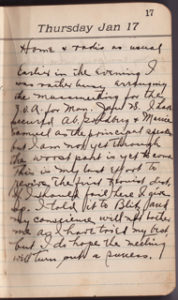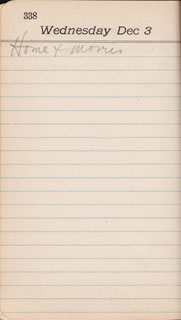
——–

New York June 29, 1927
My dear Jean:
Your card in the mail
box was was the first to greet me at
my homecoming, it was like a tonic
after a strenuous trip home from the resort.1
The first thing I thought of was
to find out how your folks were that
I may write you about them, so I called up
Mother, the situation at home
is this:
Everybody is well and happy,
Rob is leaving tonight for the country,
Mother may not be able to answer your
card or letter today owing to the fact
that Sally is very busy at Rosie’s helping
her pack things. Rosie will leave next
week instead of this, and pop may
remain at his old place of business.
As you see dear, I am trying to
inform you of everything that may be of
interest to you.
./.
 2
2
I was glad indeed to hear that
you like the place, you will undoubtedly
enjoy it.
Judging from the view on the
card the place looks to be a very nice one.
From your request for stamps I can
draw the conclusions that you consider
me (if not the most beloved) the most
trustworthy friend, and if you do you
certainly made no mistake because for
I do not conceive any greater friendship
than mine for you, which is enhanced with
a spirit of love and self-sacrifice.2
I am enclosing here one stamp
booklet, should you need more just write.
My experience in Atlantic City will
be long remembered not only by me bu
by all those who witnessed and
participated in that historical gathering
of the Zionist Convention.
After I mailed you the last letter
./.

from A.C. my group won many
more points. I took the floor and
spoke for 15 minutes, and that was
the only time I spoke. I may have
made any number of slips in the course
of my talk, but I succeeded in creating
the impression I intended to.3
And now my dear I am determined
to do all I can to help the Zionist
Org. during the year, I did very little
for them in the last few years, I was
rather apathetically inclined but it is going
to be different now.4
I am resting today, and the last
two days of the week I will work.
I may have written my dear
things in which you are little interested, but
you know that Zionism is a problem
in which I am gravely interested, I even
had hoped, and still am hoping that
some day you may become a leader
./.
 in the most venerable organization
in the most venerable organization
of women, the organization working
for an ideal which is the most romantic
of the ages, the org. which upholds the
honor and dignity of our eternal people
I mean as you will readily guess the
Hadassah.
And now dear forget the other younger
handsomer boys for awhile and write
a nice big letter to your Soul Friend (as I named
you the day I met you)5, and I on my part
will write you of all the doings at home.
And in closing a little blessing:
My your short vacation be a most enjoy-
able one, May the Almighty watch over you
and keep you from harm.
My He open your eyes and make you
see the truth (in regard to your choice of an
eternal friend).
So here I am closing again with
the usual regards and kisses
Your lonely
Harry.
—————
Matt’s Notes
One quick note for the antique stationery lovers out there: Papa wrote this letter on two wide sheets of paper, folded tabloid-style, that have rough-cut, silvery edges. Here’s a closer look:

And here’s an even closer look at the edging:

I suppose I find this interesting because there has to be some story behind his switch to this paper. Was it left over from the Z.O.A. convention? Did he borrow it from a neighbor? Was it expensive, and if so did he reserve it for letters to my grandmother? What would the answer reveal?
1 – Papa had just stayed at the Ritz-Carlton in Atlantic City while attending the 1927 Zionist Organization of America conference. The return train ride from Atlantic City to New York City took about three hours via the Pennsylvania Railroad with stops in Hammanton, Burlington and Trenton (according to Fred, the Managing Director of Transportation Research for Papa’s Diary Project) and was perhaps “strenuous” due to summer crowds and the hectic procedures associated with the Z.O.A. convention’s conclusion.
Then again, Papa may have exaggerated his trip’s strenuousness a bit in order to emphasize the “tonic” effect of my grandmother’s card; he was always trying to find ways to get her to write him more, as he does in this very letter.
<!–  –>
–>
2 – Though it’s a bit sad to see Papa grasping at straws for signs of my grandmother’s affection, his interpretation of her request for stamps is not all spin. As we’ve discussed before, one of his most memorable qualities was his capacity to see the good in the world and find delight in the actions, no matter how mundane, of those he loved. Thus, when my grandmother asked for a book of stamps it became an endorsement of his trustworthiness as opposed to an indication of her willingness to exploit his attentiveness.
Also in evidence is Papa’s fundamental unselfishness when he says “I do not conceive any greater friendship than mine for you, which is enhanced with a spirit of love and self-sacrifice.” Papa was one of those rare people who took true satisfaction in selflessness, who would not be happy unless he was working toward the happiness of others. The loneliness he wrote of in his 1924 diary was rooted in his inability to adequately express this instinct, the frustration of an artist denied his canvass. In early 1925, he thought he found his canvass in my grandmother, but after two-and-a-half years of her indifference, he feared he was mistaken. If it seems a bit overwrought for him to answer her request for stamps by describing his spirit of love and self-sacrifice, it’s in keeping with the direction of his 1927 letters, many of which show how desperate he’d become to express his generosity through her.
3 – Papa had been part of an opposition group at the Z.O.A. convention that tried to oust from office Lewis Lipsky, the organization’s longtime president. Though the opposition failed and Lipsky was reelected, the convention delegates, according to the New York Times, “ran head-on into a hurricane” on the last day of the convention “over the selection of an administrative committee…for the coming year.” Most of the controversy focused on the whether or not Z.O.A. fixture Abraham Goldberg should have lost his seat on the committee to Anna Moskowitz Kross, a Hadassah leader. The Times went on to describe the scene:
To the Goldberg supporters Mrs. Kross was a comparative newcomer whose reputation had been made outside the Zionist movement. Those opposing Mr. Goldberg considered him a symbol of the past….
The storm broke on the floor of the convention this afternoon, with shouting, interruptions and objections such as even this convention had not yet produced. Time and again the voices of speakers were drowned out by shouts of excited delegates…
Papa’s own 15-minute speech must have been part of the drama described above, and as a member of the anti-Lipsky group he would have spoken out against Goldberg who, according to the Times, “had often criticized Hadassah and the power it wielded in the Zionist Organization.” As my legions of readers will certainly remember, Papa wrote in his 1924 diary of his admiration for Goldberg (he booked Goldberg to speak at an event and hung out with him afterward) and showed a certain distaste for Hadassah, so his attitudes about both had clearly changed by 1927.
In the end, Lipsky backed Kross “for the sake of harmony” and Goldberg lost his seat.
4 – Papa’s 1924 diary and letters from subsequent years are full of references to the Zionist meetings he arranged, events he attended, and donations he made, so it’s curious to see him characterize himself as “apathetically inclined”. Perhaps, because his need to help others was insatiable and his Zionist work was a manifestation of that need, he was simply incapable of feeling like he was ever doing all he could.
5 – Indeed, Papa uses the expression “Soul Friend” in the first of his letters to my grandmother.
—–
References:









 –>
–>